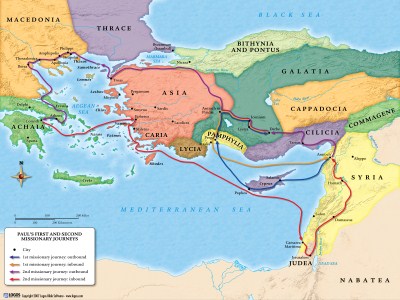7:1 since we have these promises Refers to the ot quotations in 2 Cor 6:16–18. God’s adoption of His people calls the Corinthian believers to holiness. They must not associate with those who seek to divide the church or who tempt them to engage in idolatry (see note on 6:14–7:1).
7:2–4 Paul concludes the lengthy defense of his ministry (2:14–7:4) by repeating his desire for the Corinthians to open their hearts to him (vv. 2; 6:13). He defends his behavior (v. 2) and motivation (v. 3), characterizing both as pure. Finally, he expresses his confidence in the Corinthians (v. 4). |
7:2 Make room for us in your hearts Paul repeats his appeal from 6:13 (see note on 6:11).
We have wronged no one See note on 1:12; compare note on 6:3–10.
7:3 do not say this to condemn you Paul clarifies that he is not assigning blame, nor does he find fault with the Corinthians. Rather, he is defending himself against unwarranted accusations.
7:4 I am filled with encouragement Paul exhibits confidence because of the report of Titus, his missionary companion who visited Corinth on his behalf (v. 7).
7:5–16 Paul returns to his travel details after a long defense and explanation of the nature of his apostleship under the new covenant (2:14–7:4). He picks up where he left off in 2:13 with his arrival in Macedonia (v. 5). He then expresses the comfort and encouragement he felt when hearing about the Corinthians’ repentance and obedience from Titus (7:6–15). As in v. 4, he expresses his confidence in the Corinthians (v. 16). |
Paul’s Third Missionary Journey (ad 52–57) |
Paul visits Galatia and Phrygia |
Paul stays at Ephesus and writes 1 Corinthians |
Paul visits Macedonia and writes 2 Corinthians |
7:5 when we arrived in Macedonia Paul resumes the account of his travel from 2:13.
7:6 comforts See 1:3 and note.
7:7 your mourning Titus confirmed that the Corinthians responded to Paul’s previous letter with repentance (2 Cor 7:8).
(2 Cor 7:8).
7:8 my letter It is uncertain what specific issues Paul addressed in his letter, but there may have been some hostility toward him and his apostleship. His opponents accused him of writing to frighten or intimidate the Corinthian believers (see 10:9 and note). While his letter caused them grief, his intention was to prompt them to turn from their sin and return to God (v. 9). See 2:3 and note.
7:9 grieved to repentance Godly sorrow requires more than just emotion; it requires action (Matt 3:8; Luke 3:8). See 2 Cor 2:5–11 and note.
(Matt 3:8; Luke 3:8). See 2 Cor 2:5–11 and note.
7:10 leading to salvation Paul contrasts godly grief with worldly grief: Godly grief leads to salvation, whereas worldly grief leads to death. This is because godly grief brings repentance or a desire to change. In v. 11, Paul points to the ways godly grief benefited the Corinthian believers.
7:12 one who did wrong Probably refers to the person who opposed Paul and questioned his apostolic authority (see 2:5–8).
one who had been wronged Refers to Paul.
diligence Refers to the Corinthians’ effort to be reconciled with Paul. The person who opposed Paul created division in the church. Paul hopes the believers will once again demonstrate their loyalty to his authority so that they can be unified around Christ’s teachings again and thus help spread the gospel.
7:13 have been encouraged Paul is encouraged by the Corinthians’ repentance and their renewed partnership with him.
refreshed by all of you Since some Corinthians expressed hostility toward Paul, he may have felt concern about how believers would receive Titus, his representative; Paul was relieved to know that they provided adequate hospitality for his coworker.
for his coworker.
7:14 have boasted Paul complimented the Corinthian believers when speaking to Titus about them. They experienced a powerful demonstration of the Spirit when Paul ministered in Corinth (1 Cor 2:4).
everything to you in truth Probably refers to the explanation about his travel plans (see note on 2 Cor 1:17).
proven to be true Their repentance also demonstrated the Spirit’s work among them.
7:15 fear and trembling Suggests the Corinthians acknowledged Titus’ representation of Paul’s apostolic authority.
7:16 completely confident Paul rejoices because his confidence in the Corinthian church has not been in vain (see v. 13 and note). Here, his rejoicing serves as a transition to the next section (8:1–9:15), where Paul asks the Corinthians to donate to the collection for the church in Jerusalem,
for the church in Jerusalem, confident that they will willingly help (9:1–2).
confident that they will willingly help (9:1–2).

|
About Faithlife Study BibleFaithlife Study Bible (FSB) is your guide to the ancient world of the Old and New Testaments, with study notes and articles that draw from a wide range of academic research. FSB helps you learn how to think about interpretation methods and issues so that you can gain a deeper understanding of the text. |
| Copyright |
Copyright 2012 Logos Bible Software. |
| Support Info | fsb |
 Loading…
Loading…


